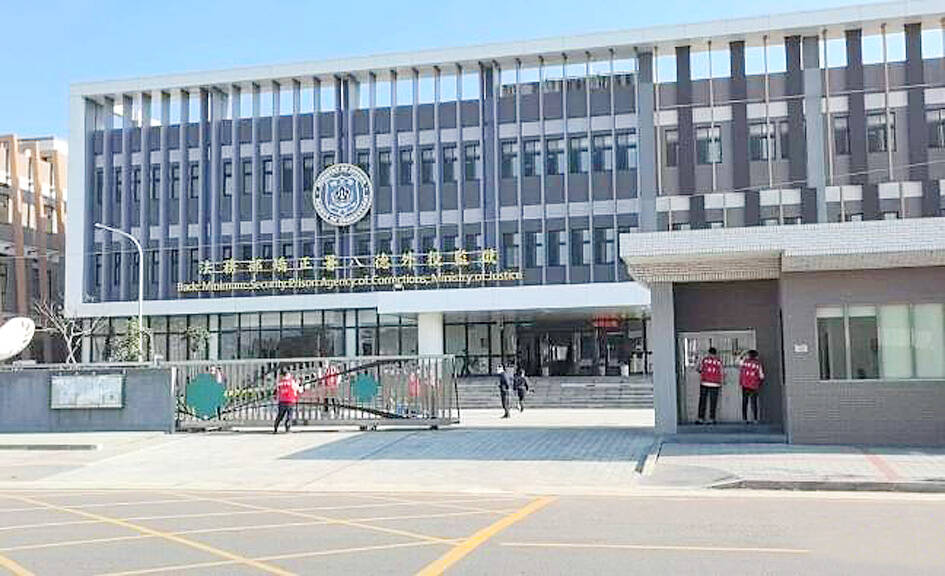Taiwan’s prisons are overcrowded, with some facilities operating beyond capacity due to a rise in the number of inmates, particularly for fraud-related offenses, Agency of Corrections Director Chou Hui-huang (周輝煌) said yesterday.
Asked at a legislative committee meeting about prison overcrowding, Chou said that fraud has become the leading offense among inmates.
As of Sunday, the nation’s authorized inmate capacity was 60,552, while the number of people imprisoned was 60,945 — an excess of more than 300 inmates. The most overcrowded facility is the Taoyuan Women’s Prison.

Photo: Taipei Times
The number of inmates at the Taoyuan facility has in the past few years consistently exceeded its capacity of 1,027 inmates, reaching 1,499 on Thursday last week, agency data showed.
Chou said the government is implementing prison expansion and reconstruction plans.
Projects at the Bade Minimum-Security Prison in Taoyuan and the Changhua Detention Center in Changhua County are expected to increase capacity to accommodate 3,459 more inmates, he said.
Expansion plans for the Taoyuan Women’s Prison, the Taipei Detention Center and the Taipei Women’s Detention Center are also under way.
The agency is relocating inmates based on early warning indicators of overcrowding to ensure balanced capacity and to reduce custodial burdens, Chou said.
During the legislative committee session, Taiwan People’s Party Chairman Huang Kuo-chang (黃國昌) said that while the Agency of Corrections is advocating a “smart prison” initiative, the Bade Minimum-Security Prison project failed preliminary inspections between January and March 2023, with 2,279 problems identified, a report released on June 2 by the National Audit Office showed.
The issues ranged from system connectivity failures to uneven walls and other electrical or architectural defects, Huang said, adding that as of the end of March, 30 remained unresolved.
He asked the agency to report back to the committee within six weeks on improvements being made.

The first two F-16V Bock 70 jets purchased from the US are expected to arrive in Taiwan around Double Ten National Day, which is on Oct. 10, a military source said yesterday. Of the 66 F-16V Block 70 jets purchased from the US, the first completed production in March, the source said, adding that since then three jets have been produced per month. Although there were reports of engine defects, the issue has been resolved, they said. After the jets arrive in Taiwan, they must first pass testing by the air force before they would officially become Taiwan’s property, they said. The air force

The Coast Guard Administration (CGA) yesterday said it had deployed patrol vessels to expel a China Coast Guard ship and a Chinese fishing boat near Pratas Island (Dongsha Island, 東沙群島) in the South China Sea. The China Coast Guard vessel was 28 nautical miles (52km) northeast of Pratas at 6:15am on Thursday, approaching the island’s restricted waters, which extend 24 nautical miles from its shoreline, the CGA’s Dongsha-Nansha Branch said in a statement. The Tainan, a 2,000-tonne cutter, was deployed by the CGA to shadow the Chinese ship, which left the area at 2:39pm on Friday, the statement said. At 6:31pm on Friday,

The Chinese People’s Liberation Army Navy’s (PLAN) third aircraft carrier, the Fujian, would pose a steep challenge to Taiwan’s ability to defend itself against a full-scale invasion, a defense expert said yesterday. Institute of National Defense and Security Research analyst Chieh Chung (揭仲) made the comment hours after the PLAN confirmed the carrier recently passed through the Taiwan Strait to conduct “scientific research tests and training missions” in the South China Sea. China has two carriers in operation — the Liaoning and the Shandong — with the Fujian undergoing sea trials. Although the PLAN needs time to train the Fujian’s air wing and

STRIKE: Some travel agencies in Taiwan said that they were aware of the situation in South Korea, and that group tours to the country were proceeding as planned A planned strike by airport personnel in South Korea has not affected group tours to the country from Taiwan, travel agencies said yesterday. They added that they were closely monitoring the situation. Personnel at 15 airports, including Seoul’s Incheon and Gimpo airports, are to go on strike. They announced at a news conference on Tuesday that the strike would begin on Friday next week and continue until the Mid-Autumn Festival next month. Some travel agencies in Taiwan, including Cola Tour, Lion Travel, SET Tour and ezTravel, said that they were aware of the situation in South Korea, and that group